Juho Pohjalainen's Blog: Pankarp
January 11, 2025
Child Prodigies Suck Actually
Here's Mozart, aged eight. Already a master pianist. Composing symphonies. Isn't that impressive?
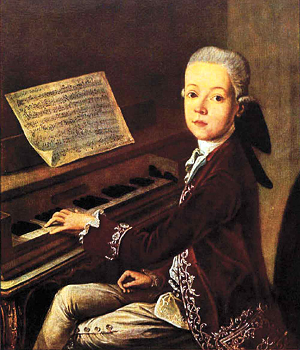
No.
Fuck that guy.
Kids pick up some complicated stuff from time to time, and any time they do, we put them up on a pedestal and praise them for it. Look at that, he learned something that most of us only learn as grown-ups. But so what? Nothing says you need to be a grown-up to learn any of it - you just need to put the time to it, and some of us get to start younger than others.
They don't know any better yet. They can't make meaningful decisions for themselves yet. They don't know what they want to be when they grow up. They don't know if it's this thing they're now doing. They just like it, it's fun to them, so they keep at it. And they have some distinct advantages that we tend to ignore: a lot of time in their hands with zero expectations or obligations, parents that indulge them in everything, a curious mindset always up for new things to try, and, sometimes, when the stars are right, these things all coming together in the best of ways and getting them started on the road to stardom. The world - or slightly overbearing mother - offering them something that gets their neurons going just right, and off they go. In fiction you could add something more magical and inexplicable, like super-powers or divine blessings or a genuinely bigger brain, but it comes down to the same thing.
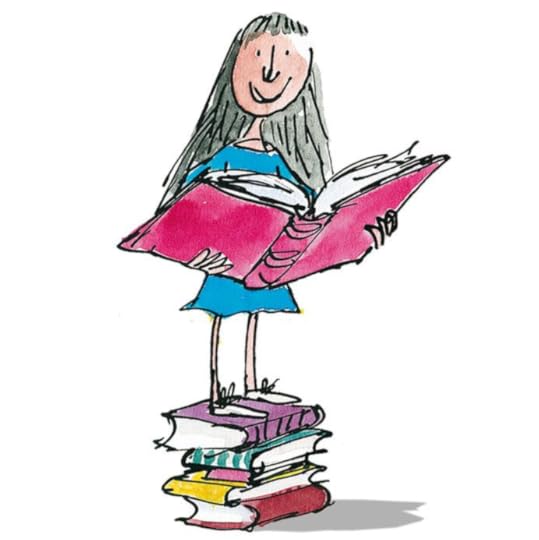
None of it was up to them. None of it was by choice, and therefore, none of it was deserved. Even if they did put the work in, managed to focus for an extended period of time to hone their talent... well, we can all do that. And, again, they had it easy.
I therefore submit that if you want to praise someone, you should praise the older people for doing the same. Mid-thirties, forties, older. These are the people well set in their ways. People with obligations and responsibilities: family, work, bills, all eating into their time and gnawing at their mental fortitude. With many advanced cases of mental barriers and neuroses that would stop them from doing anything too unusual. With well-established circles of friends and acquaintances and family that, in all likelihood, have entirely different priorities and couldn't offer any help even if sought for.
Such a person managed to break free out of their comfort zones and pick up a new hobby, even for a little while, even casually, that would be a thing worth complimenting them. And if they managed to actually invest in the time and effort, blood and sweat and tears, to get really good at this thing of theirs? That would be a laudable thing indeed. They would deserve all the acclaim we could heap upon them.
Save your adulation for these folks, not for the snot-nosed little brats.


No.
Fuck that guy.
Kids pick up some complicated stuff from time to time, and any time they do, we put them up on a pedestal and praise them for it. Look at that, he learned something that most of us only learn as grown-ups. But so what? Nothing says you need to be a grown-up to learn any of it - you just need to put the time to it, and some of us get to start younger than others.
They don't know any better yet. They can't make meaningful decisions for themselves yet. They don't know what they want to be when they grow up. They don't know if it's this thing they're now doing. They just like it, it's fun to them, so they keep at it. And they have some distinct advantages that we tend to ignore: a lot of time in their hands with zero expectations or obligations, parents that indulge them in everything, a curious mindset always up for new things to try, and, sometimes, when the stars are right, these things all coming together in the best of ways and getting them started on the road to stardom. The world - or slightly overbearing mother - offering them something that gets their neurons going just right, and off they go. In fiction you could add something more magical and inexplicable, like super-powers or divine blessings or a genuinely bigger brain, but it comes down to the same thing.

None of it was up to them. None of it was by choice, and therefore, none of it was deserved. Even if they did put the work in, managed to focus for an extended period of time to hone their talent... well, we can all do that. And, again, they had it easy.
I therefore submit that if you want to praise someone, you should praise the older people for doing the same. Mid-thirties, forties, older. These are the people well set in their ways. People with obligations and responsibilities: family, work, bills, all eating into their time and gnawing at their mental fortitude. With many advanced cases of mental barriers and neuroses that would stop them from doing anything too unusual. With well-established circles of friends and acquaintances and family that, in all likelihood, have entirely different priorities and couldn't offer any help even if sought for.
Such a person managed to break free out of their comfort zones and pick up a new hobby, even for a little while, even casually, that would be a thing worth complimenting them. And if they managed to actually invest in the time and effort, blood and sweat and tears, to get really good at this thing of theirs? That would be a laudable thing indeed. They would deserve all the acclaim we could heap upon them.
Save your adulation for these folks, not for the snot-nosed little brats.

Published on January 11, 2025 09:43
•
Tags:
child-prodigies, child-prodigy, elric, matilda, mozart
December 15, 2023
Westeros versus Mordor
Picture a gritty low-fantasy kingdom, the likes that have come back in vogue these past couple decades. Everything's dirty, all the lords are bastards, war everywhere, women get violated, heroes die quickly. Everyone is miserable. Game of Thrones, am I right?
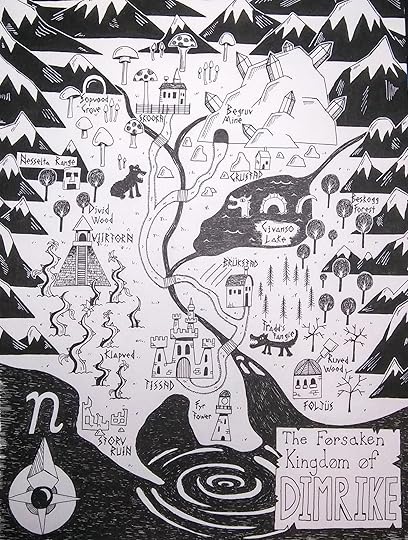
Nope! It's the Dark Lord's Shadow-Realm, where he ever plots the demise and downfall of the good peaceful folk that thrive beyond his borders!
We're being told that it's "realistic". That it's how things actually are, outside of lurid fantasies and escapism. That true change is impossible, that you have no power to do anything, and that if you try, you'll die miserable. Being good sucks, villains always win.
And that's precisely what the Dark Lord would want you to think. I bet he'd style himself as the High King or some shit, too, and all his minions and lackeys are Knights and Dukes and other such shiny respectable titles, to further legitimize himself and to mock the truly good people, drive home the point that they're no better than he is. What if they complain? Why, they're the Dark Lords actually! So everything's muddled up and twisted and nothing makes sense anymore.
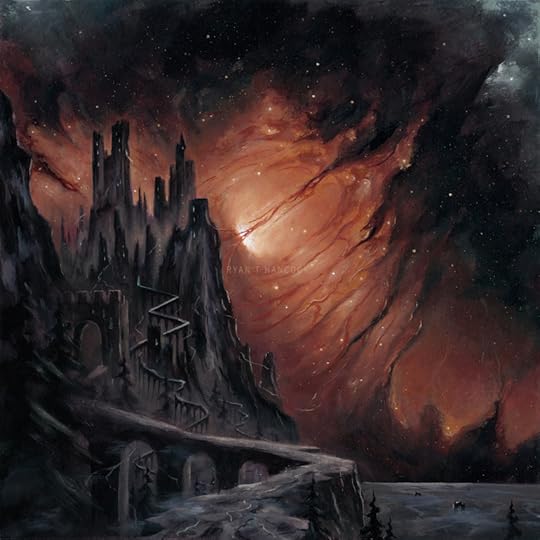
When he's inevitably defeated and the actual heroes march in to save the day and bring freedom and justice and true equality, the Dark Lord's downtrodden subjects will be leery and suspicious and wonder just what the catch is. So beaten and broken they are, they can't even recognize the true goodness when it comes their way. It will be a long and rocky road to bring them around. Some will never be convinced.
These are some of the things I've been thinking of for this year's NaNoWriMo, which I'm still writing. I feel like it could make for an effective twist: the readership of today has been conditioned to expect their grit and grime and low-fantasy, and what with how close the two concepts come, it'd be quite easy to pull the rug on them. Turns out it's all pretty bad and that we shouldn't tolerate it.
And perhaps we don't need to. Perhaps we can fight it for real.
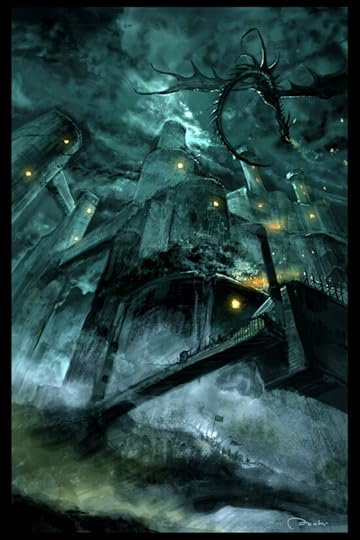

Nope! It's the Dark Lord's Shadow-Realm, where he ever plots the demise and downfall of the good peaceful folk that thrive beyond his borders!
We're being told that it's "realistic". That it's how things actually are, outside of lurid fantasies and escapism. That true change is impossible, that you have no power to do anything, and that if you try, you'll die miserable. Being good sucks, villains always win.
And that's precisely what the Dark Lord would want you to think. I bet he'd style himself as the High King or some shit, too, and all his minions and lackeys are Knights and Dukes and other such shiny respectable titles, to further legitimize himself and to mock the truly good people, drive home the point that they're no better than he is. What if they complain? Why, they're the Dark Lords actually! So everything's muddled up and twisted and nothing makes sense anymore.

When he's inevitably defeated and the actual heroes march in to save the day and bring freedom and justice and true equality, the Dark Lord's downtrodden subjects will be leery and suspicious and wonder just what the catch is. So beaten and broken they are, they can't even recognize the true goodness when it comes their way. It will be a long and rocky road to bring them around. Some will never be convinced.
These are some of the things I've been thinking of for this year's NaNoWriMo, which I'm still writing. I feel like it could make for an effective twist: the readership of today has been conditioned to expect their grit and grime and low-fantasy, and what with how close the two concepts come, it'd be quite easy to pull the rug on them. Turns out it's all pretty bad and that we shouldn't tolerate it.
And perhaps we don't need to. Perhaps we can fight it for real.

Published on December 15, 2023 08:08
•
Tags:
allegory, cynicism, dark-lords, game-of-thrones, lord-of-the-rings, low-fantasy, mordor, politics, realism, westeros
September 9, 2023
The life cycle of an idea
They just come out, unwanted and unbidden, in the thousands, if not millions. Every few minutes there's another one of the little bastards. Like the Richard Madoc bloke.
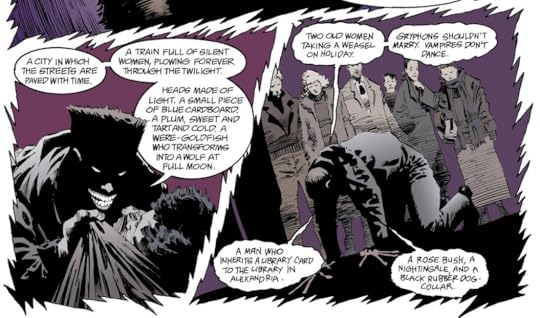
But unlike him, I never got to write even a single good novel before this started, and I never did anything to warrant a dream-god laying a curse on me.
...Did I?
And sometimes one sticks for a little longer. Nags at me and bothers me and takes up space and eats up all the other little ideas. I feel at peace for a moment. I feel like I have a purpose again. Almost without realizing, I start building it up. Or maybe it builds itself. I don't even know.
I think it could make for a blog post. Something to idly muse about, jot down some random ramblings, as I do right now.
Then it grows, and I think it could make for an actual story. I think people might want to read it. I even think I could sell it.
Then it grows too much and I start to see the cracks. I see the bloat, the fat and water and hot air, with no muscle, no substance. The idea could not sustain anything more, after all: now it's a heart that beats hot and heavy and shriveled to sustain what it can not.
And most importantly, the big question: who would ever care?
I've had better ideas, after all. I've written entire stories about them, whole books. And no one cared about those either. Why should this be different? How can that which is worse do better than the better?
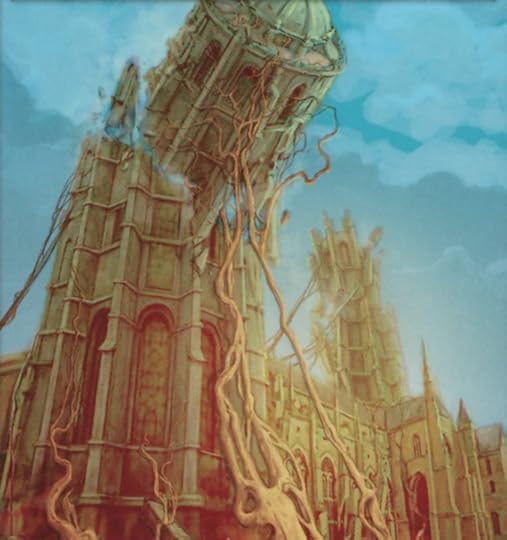
Then it collapses. It dies. It goes away. I can do nothing with it anymore. Not a story, not a blog post, not even talk about it to friends. It's gone.
Then, repeat.
Hey, I did get a blog post about it. A blog post about blog posts. I guess that's better than nothing.

But unlike him, I never got to write even a single good novel before this started, and I never did anything to warrant a dream-god laying a curse on me.
...Did I?
And sometimes one sticks for a little longer. Nags at me and bothers me and takes up space and eats up all the other little ideas. I feel at peace for a moment. I feel like I have a purpose again. Almost without realizing, I start building it up. Or maybe it builds itself. I don't even know.
I think it could make for a blog post. Something to idly muse about, jot down some random ramblings, as I do right now.
Then it grows, and I think it could make for an actual story. I think people might want to read it. I even think I could sell it.
Then it grows too much and I start to see the cracks. I see the bloat, the fat and water and hot air, with no muscle, no substance. The idea could not sustain anything more, after all: now it's a heart that beats hot and heavy and shriveled to sustain what it can not.
And most importantly, the big question: who would ever care?
I've had better ideas, after all. I've written entire stories about them, whole books. And no one cared about those either. Why should this be different? How can that which is worse do better than the better?

Then it collapses. It dies. It goes away. I can do nothing with it anymore. Not a story, not a blog post, not even talk about it to friends. It's gone.
Then, repeat.
Hey, I did get a blog post about it. A blog post about blog posts. I guess that's better than nothing.
Published on September 09, 2023 07:40
•
Tags:
ideas, inspiration, writer-s-block, writing
July 7, 2023
Ye Olde Useless Magick
Imagine questing for an ancient spell of awesome power, overcoming many dangerous trials and perils, one of your friends even sacrificing his life to break the seal. Then at last you get to whip out this planet-buster against the Dark Lord. And you find that it has all the power of a wet fart.
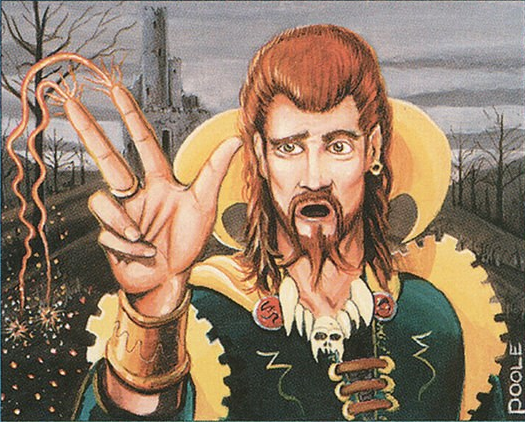
This is the predicament that the players of the 1988 Final Fantasy II found themselves in. The fabled Ultima spell, sealed away in the ancient days for its world-shattering potential, turned out to be effectively useless. Even the Emperor's mooks could pretty safely survive even a higher-level blast. The whole plotline was dropped just about as you learned the spell, and you never once need to actually cast it. Poor Minwu died for naught.
Allegedly we have one of the programmers to thank for this: he figured that such an old and outdated spell simply could not stand relevant in the face of newer and more refined techniques. That magic would naturally have advanced leaps and bounds in the many ages since Ultima had ruled the earth, and that even a simple fire spell, taken for granted by young wizards of today, could match or even overshadow it. Imagine Greek Fire, a deadly secret weapon of antiquity, pitted against modern bomber plane with a cargo hold full of napalm. You can't really argue with that.
Yet argue with it I shall!
Yes, cars get faster and safer, life-saving medicine more reliable, and communication devices more sophisticated. Technology improves. Science marches on. Problem is, as me and many others have elsewhere argued, magic is not science. It's pretty much the polar opposite of technology. Magic is art. And with art, I'm sad to say that these past few decades, if anything, we've regressed.
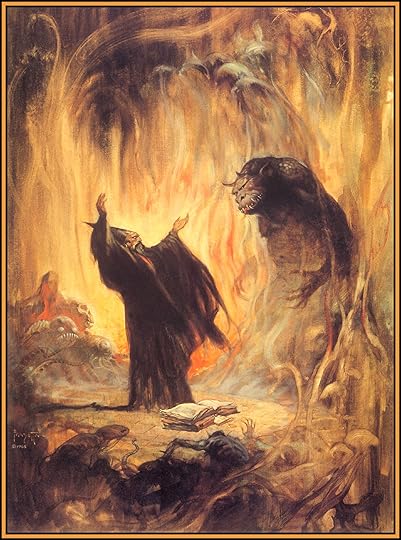
Art is hard work. Blood and sweat and tears. Cunning and problem-solving. Focus and desire. Patience and sacrifice. Whatever your canvas - paper, notepad, piece of code, circle of summoning, artifact of doom - you're pouring your soul onto it for all to see. Your anger and frustration, your depression and self-doubts, it's all fuel in the fires of creation. You rack your brain to figure out how it all comes together, and get real inventive to pull off things no one else ever has. You need to be conservative with what you put in, and lean into your limitations, turn them into advantages.
You wouldn't even have started if you didn't think it would be worth it. You won't ever give up until it's perfect and just right. Every hardship you face, every hurdle, even the tiniest of chores and errands and maintenance, only serves to fuel your determination and conviction and keep you focused on the task. And the harder the road, the more rewarding it is when you reach the end - the greater the end result, and the greater the lessons you've learned of your craft, of life, of yourself.
And technology gets in the way of that. It makes things easier, and this is one place in the world where this should not happen. It's like putting an escalator up a tall mountain road. Sure, the view's still great, but it doesn't feel the same way. You don't feel any ache or pain and your muscles didn't grow at all. It's not an adventure anymore, you could've just gone up there on a whim.
True enough, typing up a whole book is still pretty tough, even on a computer. There's still effort and great lessons and the beautiful sense of accomplishment, none of that has gone anywhere. Even to this day, great fantasies and biographies let us marvel the souls and blood of their authors.
 ut how's your handwriting doing? Wouldn't it just look so much grander with your own personal style of calligraphy and fancy medieval illuminations? Can you manage anything better than chicken-scratches now, since our whole society, including the work of art, gives no incentive to do such things anymore? And if you had a story in mind that truly deserved such attention - one you wanted to go the extra mile for - just what kind of an amazing fantasy would it have to be?
ut how's your handwriting doing? Wouldn't it just look so much grander with your own personal style of calligraphy and fancy medieval illuminations? Can you manage anything better than chicken-scratches now, since our whole society, including the work of art, gives no incentive to do such things anymore? And if you had a story in mind that truly deserved such attention - one you wanted to go the extra mile for - just what kind of an amazing fantasy would it have to be?
It's the same story all over. There's a reason most of us prefer practical effects over CGI, real costumes and camera tricks and big-ass model castles; a reason the first Jaws movie was a classic, the shoddy and uncooperative shark prop turned into a great advantage, when in the modern day that'd have thrown the big computer-monster front and center in every shot and ruined the whole thing. Even the new Puss In Boots movie, beautiful as it is, obvious as it is that its creators cared and put their heart into it and came up with all these new effects and tricks, it still can't hold a candle to AKIRA that came out decades in the past. And the modern plague of noodle-handed bean-mouths, cheap and simple to do, are widely and justly mocked.
And now the AI. Now at last, with the arrival of the great apocalyptic beasts GPT and Midjourney, all effort can be excised. All thought can be put away, all cunning snuffed out, all uniqueness made cheaply available everywhere, all meaning lost. I envision a dark age for all art unlike any we've seen ever before, even in the days of Comics Code.
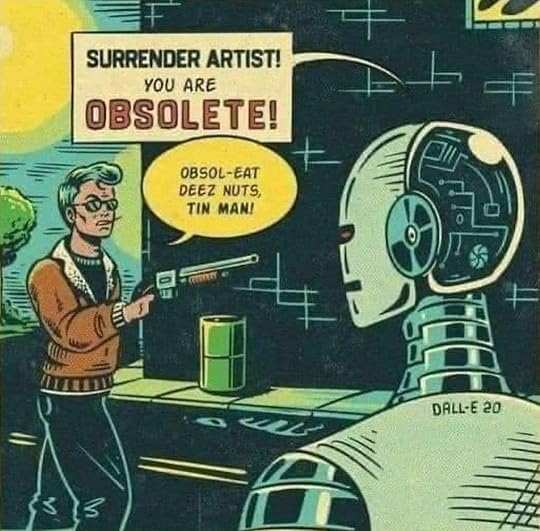
Where was I? Oh, right, magic.
Yeah, I could see magic work about the same way. Over the generations - centuries, millennia - inventive and pioneering sorcerers would refine the spellcraft, make it easier to handle, cheaper to cast, quicker, more manageable, more potent. They'd learn new techniques, delve in new dimensions, uncover new realms. Write down names of new and more powerful cosmic entities. Promise their souls to stronger gods. Craft more sophisticated artifacts and channelling tools. Brew stronger potions. You get the idea. They might never truly tame the stuff - never get to the realm of the much-maligned Magic Systems - but they'll hone their craft to such efficiency as it is possible.
Before long even children can learn simple spells, and cast fireworks without risking to blow up their heads in the backlash. Perhaps not quite everyone can learn it, now or ever, but still, it'll seep into every aspect of this magical society.
The old ways are forgotten. Who, in this day and age, would ever bother spending all night dancing under the full moon? Who would want to risk an explosive miscast, when we can now avoid such things? Why would you still beseech this god, when it's known its power in our world is almost lost? Are you really crafting your own wand?
But this is magic. The realm of mystery and wonder, of fantasy and terrible, terrible might. Not all that is lost is worthless; not all that is outdated is entirely without power. And the more careful you need to be with it, the more preparations and precautions you need, the more it will teach you in turn. And if you're so absolutely convinced that you have to eschew the new and more reliable methods in favour of the old stuff, if you must risk your life in a way no wizard in ages has had to, if you must have your own meticulously handcrafted wand, if you must spend all night out in the cold, if you must go the hard way, tread a thorny path thought cleared millennia ago... well, then you probably have a damned good reason for it, and I'm not going to argue with that. Instead, I think I'll run the hell away.
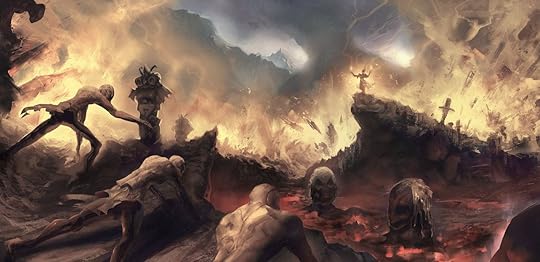
All these weak-ass ponce conjurers, when they see an old madman begin dance the old dance, they better hit the deck. Shit is about to get real.

This is the predicament that the players of the 1988 Final Fantasy II found themselves in. The fabled Ultima spell, sealed away in the ancient days for its world-shattering potential, turned out to be effectively useless. Even the Emperor's mooks could pretty safely survive even a higher-level blast. The whole plotline was dropped just about as you learned the spell, and you never once need to actually cast it. Poor Minwu died for naught.
Allegedly we have one of the programmers to thank for this: he figured that such an old and outdated spell simply could not stand relevant in the face of newer and more refined techniques. That magic would naturally have advanced leaps and bounds in the many ages since Ultima had ruled the earth, and that even a simple fire spell, taken for granted by young wizards of today, could match or even overshadow it. Imagine Greek Fire, a deadly secret weapon of antiquity, pitted against modern bomber plane with a cargo hold full of napalm. You can't really argue with that.
Yet argue with it I shall!
Yes, cars get faster and safer, life-saving medicine more reliable, and communication devices more sophisticated. Technology improves. Science marches on. Problem is, as me and many others have elsewhere argued, magic is not science. It's pretty much the polar opposite of technology. Magic is art. And with art, I'm sad to say that these past few decades, if anything, we've regressed.

Art is hard work. Blood and sweat and tears. Cunning and problem-solving. Focus and desire. Patience and sacrifice. Whatever your canvas - paper, notepad, piece of code, circle of summoning, artifact of doom - you're pouring your soul onto it for all to see. Your anger and frustration, your depression and self-doubts, it's all fuel in the fires of creation. You rack your brain to figure out how it all comes together, and get real inventive to pull off things no one else ever has. You need to be conservative with what you put in, and lean into your limitations, turn them into advantages.
You wouldn't even have started if you didn't think it would be worth it. You won't ever give up until it's perfect and just right. Every hardship you face, every hurdle, even the tiniest of chores and errands and maintenance, only serves to fuel your determination and conviction and keep you focused on the task. And the harder the road, the more rewarding it is when you reach the end - the greater the end result, and the greater the lessons you've learned of your craft, of life, of yourself.
And technology gets in the way of that. It makes things easier, and this is one place in the world where this should not happen. It's like putting an escalator up a tall mountain road. Sure, the view's still great, but it doesn't feel the same way. You don't feel any ache or pain and your muscles didn't grow at all. It's not an adventure anymore, you could've just gone up there on a whim.
True enough, typing up a whole book is still pretty tough, even on a computer. There's still effort and great lessons and the beautiful sense of accomplishment, none of that has gone anywhere. Even to this day, great fantasies and biographies let us marvel the souls and blood of their authors.
 ut how's your handwriting doing? Wouldn't it just look so much grander with your own personal style of calligraphy and fancy medieval illuminations? Can you manage anything better than chicken-scratches now, since our whole society, including the work of art, gives no incentive to do such things anymore? And if you had a story in mind that truly deserved such attention - one you wanted to go the extra mile for - just what kind of an amazing fantasy would it have to be?
ut how's your handwriting doing? Wouldn't it just look so much grander with your own personal style of calligraphy and fancy medieval illuminations? Can you manage anything better than chicken-scratches now, since our whole society, including the work of art, gives no incentive to do such things anymore? And if you had a story in mind that truly deserved such attention - one you wanted to go the extra mile for - just what kind of an amazing fantasy would it have to be?It's the same story all over. There's a reason most of us prefer practical effects over CGI, real costumes and camera tricks and big-ass model castles; a reason the first Jaws movie was a classic, the shoddy and uncooperative shark prop turned into a great advantage, when in the modern day that'd have thrown the big computer-monster front and center in every shot and ruined the whole thing. Even the new Puss In Boots movie, beautiful as it is, obvious as it is that its creators cared and put their heart into it and came up with all these new effects and tricks, it still can't hold a candle to AKIRA that came out decades in the past. And the modern plague of noodle-handed bean-mouths, cheap and simple to do, are widely and justly mocked.
And now the AI. Now at last, with the arrival of the great apocalyptic beasts GPT and Midjourney, all effort can be excised. All thought can be put away, all cunning snuffed out, all uniqueness made cheaply available everywhere, all meaning lost. I envision a dark age for all art unlike any we've seen ever before, even in the days of Comics Code.

Where was I? Oh, right, magic.
Yeah, I could see magic work about the same way. Over the generations - centuries, millennia - inventive and pioneering sorcerers would refine the spellcraft, make it easier to handle, cheaper to cast, quicker, more manageable, more potent. They'd learn new techniques, delve in new dimensions, uncover new realms. Write down names of new and more powerful cosmic entities. Promise their souls to stronger gods. Craft more sophisticated artifacts and channelling tools. Brew stronger potions. You get the idea. They might never truly tame the stuff - never get to the realm of the much-maligned Magic Systems - but they'll hone their craft to such efficiency as it is possible.
Before long even children can learn simple spells, and cast fireworks without risking to blow up their heads in the backlash. Perhaps not quite everyone can learn it, now or ever, but still, it'll seep into every aspect of this magical society.
The old ways are forgotten. Who, in this day and age, would ever bother spending all night dancing under the full moon? Who would want to risk an explosive miscast, when we can now avoid such things? Why would you still beseech this god, when it's known its power in our world is almost lost? Are you really crafting your own wand?
But this is magic. The realm of mystery and wonder, of fantasy and terrible, terrible might. Not all that is lost is worthless; not all that is outdated is entirely without power. And the more careful you need to be with it, the more preparations and precautions you need, the more it will teach you in turn. And if you're so absolutely convinced that you have to eschew the new and more reliable methods in favour of the old stuff, if you must risk your life in a way no wizard in ages has had to, if you must have your own meticulously handcrafted wand, if you must spend all night out in the cold, if you must go the hard way, tread a thorny path thought cleared millennia ago... well, then you probably have a damned good reason for it, and I'm not going to argue with that. Instead, I think I'll run the hell away.

All these weak-ass ponce conjurers, when they see an old madman begin dance the old dance, they better hit the deck. Shit is about to get real.
Published on July 07, 2023 13:19
•
Tags:
ai, art, forgotten, magic, magic-systems, outdated, progress, science, technology
September 30, 2022
Kitchens
Picture in your head two different kinds of kitchens, manned by different types of chefs.

The first guy stocks up to the brim before he even really starts to think about cooking anything with it, perhaps before he even knows just what he wants to make. Pots and pans, cutlery, fancy new kitchen devices to cook with, ingredients and spices to cook out of. Like a dozen different sorts of knives. A great big kitchen filled with stuff, most of which is likely going to go unused for all time.
Sometimes prospective cooks do this sort of stuff without even knowing whether they're going to ever have the time to actually use them on anything! But once they do, it's sure to inspire them: just look at all these knives, wouldn't you want to make something with them? Wouldn't you want to put all this fruit into things? You can smell it already, can't you?
Ultimately, it's just so much easier to gather this stuff than it is to actually go through the effort of actually putting it to use. Many of us do this by instinct or sudden impulse, perhaps even without noticing. Just carry a new set of knives out of the store with no memory of ever buying anything. It can become a problem.

But you can take it to undesirable extremes, I find. You can get obsessed with having a full set of everything everywhere. You talk to other chefs and they all go on about their perfect kitchens and all the things they have in them. You hear all these cooking enthusiasts go on saying things like: "He's a real chef - his kitchen is so full and so interesting!" It's easy to get the impression that this is what cooking is all about.
Yet in the end, what really matters is the food you actually make.
That's where the other kitchen comes in - the sort I prefer, if it's not clear. It's got far less cutlery and stuff, but what it does have, sees a lot of use. Every knife has nicks in them, every frying pan's always a bit greasy no matter how you wash it, and not a single vegetable sack is quite full. The smell of good cooking, everywhere: just breathe in and feel your mouth water.

From time to time you might want to make something that you're not prepared for. It might leave you a bit puzzled and aimless, for a short while, but if you stick with the idea then it's never too much of a problem to add up to your arsenal. Throw some more half-used stuff into the pile. Maybe even get suddenly inspired to add in some of the stuff you've already used, because you know it works well and you've come to like it a lot and whoever's eating your stuff always praised it.
And every time you cook something, the smell only gets stronger. It sticks to your body, too. It cannot be rid of ever again. All that look at you, know what you do for a living, and can only guess the glory you share for it.
Maybe you'll get to this point even if you started out with the first type of kitchen. Maybe all of those great many pieces of equipment and ingredient you bought - or at least most of it - does find some use sooner or later. But in the end, it doesn't really matter. You think you need to fill up a whole kitchen before you can start making stuff, that you're worth nothing if you cannot do this, you'll soon find how wrong you are. A kitchen that sees no actual use, no matter how shiny and fancy and sharp, is no kitchen at all.

ᵂʰᵃᵗᵉᵛᵉʳ ᵗʰᵃᵗ ᶦˢ, ᴵ'ᵐ ⁿᵒᵗ ᵉᵃᵗᶦⁿᵍ ᶦᵗ.

The first guy stocks up to the brim before he even really starts to think about cooking anything with it, perhaps before he even knows just what he wants to make. Pots and pans, cutlery, fancy new kitchen devices to cook with, ingredients and spices to cook out of. Like a dozen different sorts of knives. A great big kitchen filled with stuff, most of which is likely going to go unused for all time.
Sometimes prospective cooks do this sort of stuff without even knowing whether they're going to ever have the time to actually use them on anything! But once they do, it's sure to inspire them: just look at all these knives, wouldn't you want to make something with them? Wouldn't you want to put all this fruit into things? You can smell it already, can't you?
Ultimately, it's just so much easier to gather this stuff than it is to actually go through the effort of actually putting it to use. Many of us do this by instinct or sudden impulse, perhaps even without noticing. Just carry a new set of knives out of the store with no memory of ever buying anything. It can become a problem.

But you can take it to undesirable extremes, I find. You can get obsessed with having a full set of everything everywhere. You talk to other chefs and they all go on about their perfect kitchens and all the things they have in them. You hear all these cooking enthusiasts go on saying things like: "He's a real chef - his kitchen is so full and so interesting!" It's easy to get the impression that this is what cooking is all about.
Yet in the end, what really matters is the food you actually make.
That's where the other kitchen comes in - the sort I prefer, if it's not clear. It's got far less cutlery and stuff, but what it does have, sees a lot of use. Every knife has nicks in them, every frying pan's always a bit greasy no matter how you wash it, and not a single vegetable sack is quite full. The smell of good cooking, everywhere: just breathe in and feel your mouth water.

From time to time you might want to make something that you're not prepared for. It might leave you a bit puzzled and aimless, for a short while, but if you stick with the idea then it's never too much of a problem to add up to your arsenal. Throw some more half-used stuff into the pile. Maybe even get suddenly inspired to add in some of the stuff you've already used, because you know it works well and you've come to like it a lot and whoever's eating your stuff always praised it.
And every time you cook something, the smell only gets stronger. It sticks to your body, too. It cannot be rid of ever again. All that look at you, know what you do for a living, and can only guess the glory you share for it.
Maybe you'll get to this point even if you started out with the first type of kitchen. Maybe all of those great many pieces of equipment and ingredient you bought - or at least most of it - does find some use sooner or later. But in the end, it doesn't really matter. You think you need to fill up a whole kitchen before you can start making stuff, that you're worth nothing if you cannot do this, you'll soon find how wrong you are. A kitchen that sees no actual use, no matter how shiny and fancy and sharp, is no kitchen at all.

ᵂʰᵃᵗᵉᵛᵉʳ ᵗʰᵃᵗ ᶦˢ, ᴵ'ᵐ ⁿᵒᵗ ᵉᵃᵗᶦⁿᵍ ᶦᵗ.
September 5, 2022
GATE OF DJAU OPENS! New book in the Umbrakin series!
Five years I've been working of this! It feels good to have it out at last.

If you like cosmic conflicts, clash of magic and technology, grey moralities, and big dogs, science-fantasy in the vein of Moorcock, you might want to give this one a go. You can buy it right now, if you want to support me and what I'm doing here, or if you wait until tomorrow you'll get to have it for free. I don't mind. I just hope you like it.
Grab it here!
Peal is not strictly speaking the main character this time, but that's my secret: Umbrakin can be a plural.

If you like cosmic conflicts, clash of magic and technology, grey moralities, and big dogs, science-fantasy in the vein of Moorcock, you might want to give this one a go. You can buy it right now, if you want to support me and what I'm doing here, or if you wait until tomorrow you'll get to have it for free. I don't mind. I just hope you like it.
Grab it here!
Peal is not strictly speaking the main character this time, but that's my secret: Umbrakin can be a plural.
July 12, 2022
Five years... out of thirty
A new Umbrakin is coming out sometime this spring. It's been five years in-universe since Peal crawled out of his little hole and went off to adventuring. It's also been five years in real life since I started writing seriously.
I have plans for good thirty years of the former. I don't like the idea that this translates to the whole project taking thirty years of real time as well. I've always had my mind in the present: I've been unable to think too far into the future, and this has always gotten in the way of larger plans and projects and probably been what killed some of my biggest dreams in the crib. I guess it's a bright side, that here I'm at last managing something like that.
But I also don't know what future brings, or what the world will even look like that far ahead. I don't know what else I could have done with that time, or perhaps even the possibility of trying out some of those other dreams of mine. There's a lot of scary things out there. It could be we won't even be here by then.
Oh, well. Think of the positives. You'll have something to read again soon.
I have plans for good thirty years of the former. I don't like the idea that this translates to the whole project taking thirty years of real time as well. I've always had my mind in the present: I've been unable to think too far into the future, and this has always gotten in the way of larger plans and projects and probably been what killed some of my biggest dreams in the crib. I guess it's a bright side, that here I'm at last managing something like that.
But I also don't know what future brings, or what the world will even look like that far ahead. I don't know what else I could have done with that time, or perhaps even the possibility of trying out some of those other dreams of mine. There's a lot of scary things out there. It could be we won't even be here by then.
Oh, well. Think of the positives. You'll have something to read again soon.
Published on July 12, 2022 01:54
•
Tags:
future, life, time, time-skips, umbrakin
February 17, 2022
Race and Race - Scattered Thoughts on Brown Elves
I'm sure we all have our own opinions on the new Rings of Power stuff presented to us recently. We've had a lot to talk about. Many things we feel strongly about. To me it's giving plenty food for thought in regards of setting and worldbuilding, and nonhuman races, and how far they reach and where you might find them.
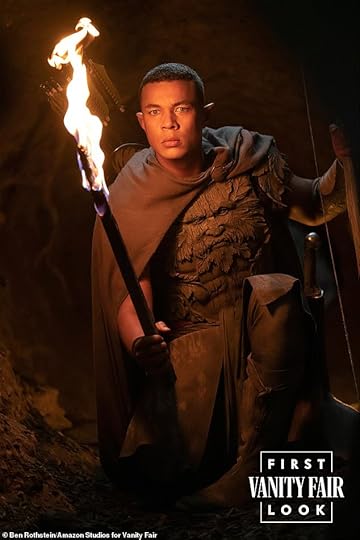
So what's with this guy? Where'd he come from, in the grand worldly scheme of things? I'm guessing Near Harad, is where him or his parents or grandparents originate: he doesn't seem quite dark-complexioned enough to have his origins in Far Harad or beyond, though I might be wrong.
After the Awakening of Elves, far in the Years of the Trees, they of course split up with some choosing to follow Oromë into Valinor, and others opting to remain behind in the land of starlight. Others still were caught by Melkor and ended up twisted into orcs. But suppose that doesn't account for all of them?
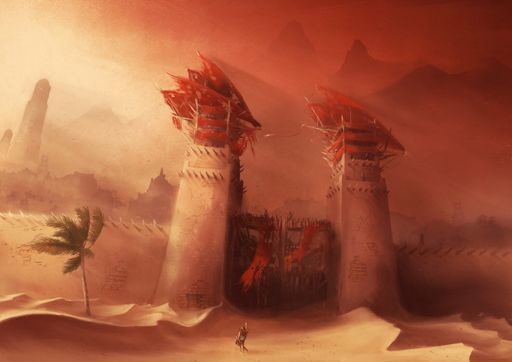
Suppose some of them - such as Arondir's ancestors - wandered south instead, to the lands of vast prairies and hot sun and bloody hugeass elephants, and here they made themselves a home? And over time, they began to adjust to the new environment, same as migrating humans adjusted to theirs? (Although in the real world it was rather the opposite, since we came from the south rather than going there, but you get what I mean.)
And I'm not just talking about Middle-Earth here. More generally, you can apply the same line of thought to just about any fantasy setting. Humans in these worlds have migrated all across the globe, so why not elves as well? Or dwarves, or halflings, or even orcs? Spread out in prehistory, filled the earth, and diverged a little bit? And there, you've got your new fantasy setting all covered!
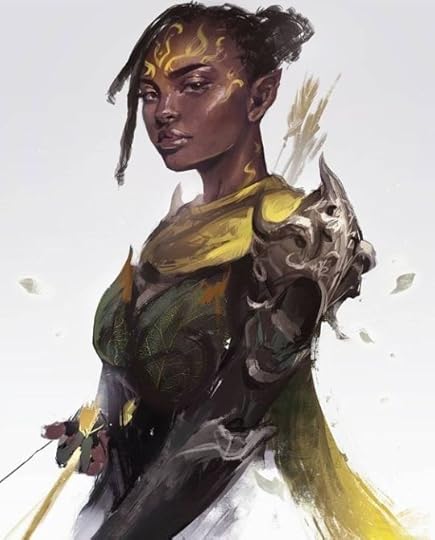
Trouble is, fantasy typically doesn't operate on long enough timeframes for this diversity to kick in. You've got your Mythic Ages and Golden Ages, your Ancient Empires, all having taken place thousands or at most tens of thousands of years ago. It took longer than that for the current major racial groups to form - and elves and dwarves, with their significantly greater lifespans, would take a longer time still. And it'd raise further questions about going backwards along the line: not about how they formed the way they did, but where did elves and dwarves come from in the first place? How did they evolve, differ from humanity? Or did humanity differ from them? And what could have prompted the outrageously varying lifespans?
Or maybe they're aliens? Visitors from space, that landed here (or crash-landed) eons ago when ancestors of man still lived in trees. The different ethnicities could have come from different ships, different areas from their old homeworld, explaining their differences... or they might have had the time to evolve and diversify in their new home, before the present day. And the orcs were of course an ancient bioweapon that got loose and made a mess of the local ecosystem.
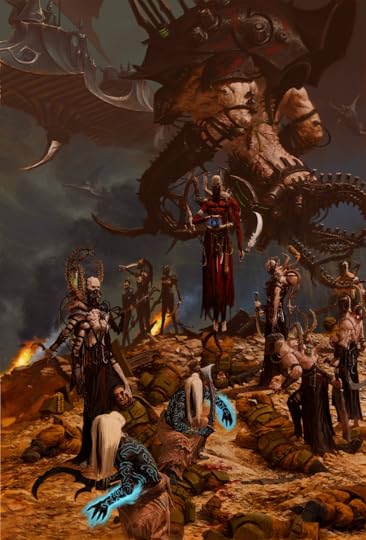
We've drifted pretty deep in the realm of science fiction now. That's not necessarily a bad thing - I like to mix the two a lot myself - but I get the feeling it's not what Tolkien was going for. So let's wind back a little and look at this whole thing from a mythological standpoint.
Creation myths! Divine meddling upon a virgin earth! Forming this ball out of a bunch of space-stones, then seeding the planet with all varieties of life! (They might even be aliens themselves, masters of genetic engineering, but that's going back to scifi so I'mma stop here.) Elves usually came first out of the oven, shortly before or after things such as dragons and serpentmen and other weirder things, followed by dwarves, then finally men.
And why would these gods stick to just one geographical location? And as they spread around, why wouldn't they experiment a little bit, tweak their core design to better suit the environment they stick them in? Pale elves up north, dark elves in the south to the realm of high burning sun, for instance. That'd work out just fine, wouldn't it?
But think of it... these other realms, other kingdoms and continents, would have their own myths. Their own gods and heroes, their own strange nonhuman beings lurking in the fringes of the earth. In the east, the Yokai. In the far south, the Tikoloshe or Hili. Just to name a couple examples. Elves, dwarves, and the gods that created them, hold dominion just over the relatively small land of Europe. To spread farther than that, they'd have to...

Just try and imagine it - conquering pantheon emerges on the shores, exterminates the local gods, puts to torch their worshipers, smashes their idols, then in the place of all these things spreads out their own creatures, just ever so slightly changed for the sake of diversity... when in truth, what they're doing is homogenizing things. Make it all look the exact same, just with different amounts of skin pigmentation. One myth to rule them all. All of a sudden it sounds pretty ugly.
Mind you, you could do a lot with that idea. A great epic divine war, the gods of one realm seeking to invade another. Or if you don't feel like it, then you might want to think about diversifying in the other direction: if you bring elves to the jungles of the Darkest Africa, then some of those jungle creatures might end up moving to the cold north. Sort of a great fantasy cultural exchange program. But I'm not sure I like that idea very much: it makes all of the realms look less unique, more of the same, the same way in the real world all the nations have started to blend together into one big capitalistic mass of grey towers and fast food joints.

No, I think I'd much rather keep things as different as possible. It's fantasy, after all: filled with strange alien realms where few people have gone and where nothing is the same, and with all manner of creatures living in the deep woods and dark caves and desolate mountaintops. Always keep things fantastic. Always keep things different. Instead of spreading out elves everywhere, look into the myths and tales of these other cultures, and tap from those. You'll get so much more out of your tales that way, I think.
But perhaps there's one last explanation - one final way to make everything work. Perhaps Eru Illúvatar simply likes to play with colors. He's put a few brown elves and black dwarves here and there, purely for the sake of variety. And if this were the case, then I must ask...

Where are the Pink Elves?

So what's with this guy? Where'd he come from, in the grand worldly scheme of things? I'm guessing Near Harad, is where him or his parents or grandparents originate: he doesn't seem quite dark-complexioned enough to have his origins in Far Harad or beyond, though I might be wrong.
After the Awakening of Elves, far in the Years of the Trees, they of course split up with some choosing to follow Oromë into Valinor, and others opting to remain behind in the land of starlight. Others still were caught by Melkor and ended up twisted into orcs. But suppose that doesn't account for all of them?

Suppose some of them - such as Arondir's ancestors - wandered south instead, to the lands of vast prairies and hot sun and bloody hugeass elephants, and here they made themselves a home? And over time, they began to adjust to the new environment, same as migrating humans adjusted to theirs? (Although in the real world it was rather the opposite, since we came from the south rather than going there, but you get what I mean.)
And I'm not just talking about Middle-Earth here. More generally, you can apply the same line of thought to just about any fantasy setting. Humans in these worlds have migrated all across the globe, so why not elves as well? Or dwarves, or halflings, or even orcs? Spread out in prehistory, filled the earth, and diverged a little bit? And there, you've got your new fantasy setting all covered!

Trouble is, fantasy typically doesn't operate on long enough timeframes for this diversity to kick in. You've got your Mythic Ages and Golden Ages, your Ancient Empires, all having taken place thousands or at most tens of thousands of years ago. It took longer than that for the current major racial groups to form - and elves and dwarves, with their significantly greater lifespans, would take a longer time still. And it'd raise further questions about going backwards along the line: not about how they formed the way they did, but where did elves and dwarves come from in the first place? How did they evolve, differ from humanity? Or did humanity differ from them? And what could have prompted the outrageously varying lifespans?
Or maybe they're aliens? Visitors from space, that landed here (or crash-landed) eons ago when ancestors of man still lived in trees. The different ethnicities could have come from different ships, different areas from their old homeworld, explaining their differences... or they might have had the time to evolve and diversify in their new home, before the present day. And the orcs were of course an ancient bioweapon that got loose and made a mess of the local ecosystem.

We've drifted pretty deep in the realm of science fiction now. That's not necessarily a bad thing - I like to mix the two a lot myself - but I get the feeling it's not what Tolkien was going for. So let's wind back a little and look at this whole thing from a mythological standpoint.
Creation myths! Divine meddling upon a virgin earth! Forming this ball out of a bunch of space-stones, then seeding the planet with all varieties of life! (They might even be aliens themselves, masters of genetic engineering, but that's going back to scifi so I'mma stop here.) Elves usually came first out of the oven, shortly before or after things such as dragons and serpentmen and other weirder things, followed by dwarves, then finally men.
And why would these gods stick to just one geographical location? And as they spread around, why wouldn't they experiment a little bit, tweak their core design to better suit the environment they stick them in? Pale elves up north, dark elves in the south to the realm of high burning sun, for instance. That'd work out just fine, wouldn't it?
But think of it... these other realms, other kingdoms and continents, would have their own myths. Their own gods and heroes, their own strange nonhuman beings lurking in the fringes of the earth. In the east, the Yokai. In the far south, the Tikoloshe or Hili. Just to name a couple examples. Elves, dwarves, and the gods that created them, hold dominion just over the relatively small land of Europe. To spread farther than that, they'd have to...

Just try and imagine it - conquering pantheon emerges on the shores, exterminates the local gods, puts to torch their worshipers, smashes their idols, then in the place of all these things spreads out their own creatures, just ever so slightly changed for the sake of diversity... when in truth, what they're doing is homogenizing things. Make it all look the exact same, just with different amounts of skin pigmentation. One myth to rule them all. All of a sudden it sounds pretty ugly.
Mind you, you could do a lot with that idea. A great epic divine war, the gods of one realm seeking to invade another. Or if you don't feel like it, then you might want to think about diversifying in the other direction: if you bring elves to the jungles of the Darkest Africa, then some of those jungle creatures might end up moving to the cold north. Sort of a great fantasy cultural exchange program. But I'm not sure I like that idea very much: it makes all of the realms look less unique, more of the same, the same way in the real world all the nations have started to blend together into one big capitalistic mass of grey towers and fast food joints.

No, I think I'd much rather keep things as different as possible. It's fantasy, after all: filled with strange alien realms where few people have gone and where nothing is the same, and with all manner of creatures living in the deep woods and dark caves and desolate mountaintops. Always keep things fantastic. Always keep things different. Instead of spreading out elves everywhere, look into the myths and tales of these other cultures, and tap from those. You'll get so much more out of your tales that way, I think.
But perhaps there's one last explanation - one final way to make everything work. Perhaps Eru Illúvatar simply likes to play with colors. He's put a few brown elves and black dwarves here and there, purely for the sake of variety. And if this were the case, then I must ask...

Where are the Pink Elves?
December 30, 2021
Villains with good points, and why they don't do it for me
Stop me if you've heard this one. A guy has some deep concerns about the world, the society, and the future. He (or she) attempts to make changes through the usual ways, only to be stonewalled. Nothing gets better. So he decides to save the world his own way.
And because he's the bad guy, this usually involves killing a whole lot of people.

So the good guys get together, begin their quest, face their challenges, grow and get better, then finally face the villain in his lair, listen to him prattle on about saving the world by killing off ninety percent of humanity, then cap his ass and go celebrate. The world is saved.
Only, no. The villain's original motive was perfectly valid. He had a good point with the whole thing, and the world is a real mess, and after his defeat, continues to be a real mess. You thought you made a change for the better... when really, you just returned things back to the status quo.
At best, the heroes decide to look into it themselves and maybe try and do better. But most of the time they just pretend it was a happy ending all around, and leave it at that.

This never sat right with me, and having seen Kingsman: The Secret Service today, the whole issue popped right back to the front of my brain. I figured I'd talk about it a little.
Why is it always like this? Why is it that these well-intentioned world-savers always go for the very craziest and most irrational solution they come up with? Couldn't they tone it down a notch? Couldn't they maybe compromise with the heroes and find a better way to solve things? Or maybe it's the heroes that come up with a fine solution, and the villains attempt to stop it? None of these are seen all too often at all - I can't think of a single example on top of my head. If you can, let me know.
In Kingsman, for instance, Valentine could have just used his usual pretenses to put up a chip inside the head of every corrupt politician and filthy-rich corporate dickbag... then instead of seeking to keep precisely these people alive, just blown up their heads. World saved at far less casualties! But no. Perhaps the folks in charge don't want to give us any ideas.
Or, more likely, it's just easier to write villains that way. Give them at least a pretense of sympathy and humanity. Just that it doesn't really work on me: it's unrealistic, full of holes, and just doesn't work. I'd rather have the usual greedy self-centered douchenoggets: you don't need to poke holes in their plans, at least not as many.
I guess I did the exact opposite with Starving Saint. You had a villain who claimed to have good intentions, claimed to make things better for everyone, and made some good points about why he was needed and how everything was a mess... but it was obvious that he was only in on it for his own benefit, and the heroes rejected the notion primarily because he was a self-centered dick. And then they managed to make a positive impact anyway.
But most of the time my villains are just plain pricks.
And because he's the bad guy, this usually involves killing a whole lot of people.

So the good guys get together, begin their quest, face their challenges, grow and get better, then finally face the villain in his lair, listen to him prattle on about saving the world by killing off ninety percent of humanity, then cap his ass and go celebrate. The world is saved.
Only, no. The villain's original motive was perfectly valid. He had a good point with the whole thing, and the world is a real mess, and after his defeat, continues to be a real mess. You thought you made a change for the better... when really, you just returned things back to the status quo.
At best, the heroes decide to look into it themselves and maybe try and do better. But most of the time they just pretend it was a happy ending all around, and leave it at that.

This never sat right with me, and having seen Kingsman: The Secret Service today, the whole issue popped right back to the front of my brain. I figured I'd talk about it a little.
Why is it always like this? Why is it that these well-intentioned world-savers always go for the very craziest and most irrational solution they come up with? Couldn't they tone it down a notch? Couldn't they maybe compromise with the heroes and find a better way to solve things? Or maybe it's the heroes that come up with a fine solution, and the villains attempt to stop it? None of these are seen all too often at all - I can't think of a single example on top of my head. If you can, let me know.
In Kingsman, for instance, Valentine could have just used his usual pretenses to put up a chip inside the head of every corrupt politician and filthy-rich corporate dickbag... then instead of seeking to keep precisely these people alive, just blown up their heads. World saved at far less casualties! But no. Perhaps the folks in charge don't want to give us any ideas.
Or, more likely, it's just easier to write villains that way. Give them at least a pretense of sympathy and humanity. Just that it doesn't really work on me: it's unrealistic, full of holes, and just doesn't work. I'd rather have the usual greedy self-centered douchenoggets: you don't need to poke holes in their plans, at least not as many.
I guess I did the exact opposite with Starving Saint. You had a villain who claimed to have good intentions, claimed to make things better for everyone, and made some good points about why he was needed and how everything was a mess... but it was obvious that he was only in on it for his own benefit, and the heroes rejected the notion primarily because he was a self-centered dick. And then they managed to make a positive impact anyway.
But most of the time my villains are just plain pricks.
Published on December 30, 2021 15:46
•
Tags:
good-intentions, humanity-is-the-virus, kingsman-the-secret-service, starving-saint, status-quo, villains, well-intentioned-extremists
October 29, 2021
NaNoWriMo, and the Curse of Two Entirely Different Things I'd Like To Write
I decided what I was going to do this year several months before, and managed to mostly keep the inspiration in check and gradually building up... but now, with only a few days to go, something else has infringed. Something that's coming on strongly to me right now, but with very little build-up to it. Something that I'm certain will interfere with my performance if I stick to the original plan... but if I switch gears and write this new thing instead, I'm certain I can't keep up with it. I don't even know where it would go after the beginning points.
Sometimes I feel like that one author in Sandman, that gets more ideas than he can handle and is driven mad by it. And I didn't even get to sleep with a muse for it!
Sometimes I feel like that one author in Sandman, that gets more ideas than he can handle and is driven mad by it. And I didn't even get to sleep with a muse for it!
Published on October 29, 2021 03:22
•
Tags:
inspiration, nanowrimo, national-novel-writing-month
Pankarp
Pages fallen out of Straggler's journal, and others.
Pages fallen out of Straggler's journal, and others.
...more
- Juho Pohjalainen's profile
- 352 followers



